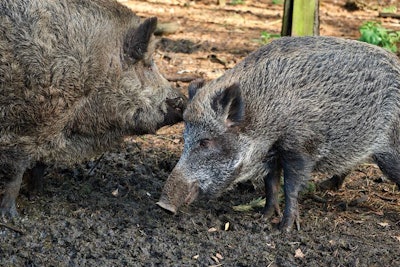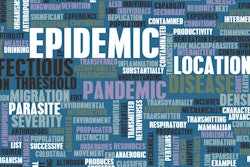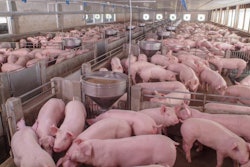
Suspicious mortality among Indonesian pigs could be linked to African swine fever.
With the number of Asian countries already known to be affected by African swine fever (ASF) standing at 11, unconfirmed reports indicate that the disease may now have spread to Indonesia.
Authorities are investigating the unexplained deaths of several pigs in two regions, according to the United Nations’ Food and Agriculture Organization (FAO). Affected regions are North Sumatra and East Nusa Tenggara. The latter includes the western part of the island of Timor. ASF was confirmed in the neighboring state of East Timor (also known as Timor-Leste) during September.
As ASF spreads in the Asia-Pacific region, Australia is putting in place new measures to try to keep the infection out of its territory. In a recent development, a dog trained to sniff out meat products has joined the border authorities at an airport in the state of Queensland. According to Queensland Country Life, Cairns International Airport is a widely used point of entry to the country by visitors from ASF-infected countries.
New outbreaks confirmed in the Philippines
Over the past week, the national animal health agencies in the Philippines, South Korea and China have officially reported new outbreaks of ASF to the World Organisation for Animal Health (OIE).
In the Philippines, the agriculture department has confirmed 9 new outbreaks of ASF to the OIE. Starting between September 15 and October 18, 7 of the outbreaks occurred in clusters in Quezon City, and the other two were in Pangasinan. Both regions are on the island of Luzon — in the National Capital Region and Ilocos Region, respectively. According to the report, a total of 271 pigs were lost due to the disease through mortality or destruction in these outbreaks.
This was the first official update on the ASF situation in the country since early September, when the agriculture department reported ASF cases to the OIE for the first time. These cases had occurred at the end of July as a cluster in 7 outbreaks in the province of Rizal, which is just east of the capital, Manila. Almost 8,000 pigs died or were culled in those outbreaks.
Philippines tightens ASF controls
Orders have been sent from the Presidential Office to regional governments to take appropriate measures to manage, contain and control the transmission of ASF, reported Canadian Inquirer recently. The order was prompted by the revelation that the ASF virus had been detected in meat products from a company based in Santa Mesa, Manila.
Provincial governments have been taking measures to prevent the entry of ASF into their territories. While Abra province has deployed police in key border locations, reports the Philippine News Agency (PNA), another has set up the country’s first automated washing facility for animal transport vehicles on a major road on Luzon.
To keep the disease out of Ilocos Norte in the north of Luzon, the provincial government has set up a special task force, reports the Philippines Information Agency (PIA).
Last week, PIA reported that inspection of two containers at the port in Manila revealed them to contain pork products from China valued at PHP3.5 million (US$69,000). According to the documentation, they had been labeled as tomato and noodle products. Because of the mislabeling and ASF risk, the shipments were seized.
As a result of ASF, jobs in the meat processing sector in Luzon are under now threat. As the majority of provinces in the Philippines have now banned the entry of meat products from the island, workers in meat factories there face losing their jobs, reports ABS-CBN. With pig meat sales down 30-40%, profits have halved, according to the meat processors’ association.
The source of previously reported ASF-infected meat products still has not been identified officially. Authorities continue to investigate the virus-contaminated products, which were seized at the port of Calapan in Occidental Mindoro in early October, according to a another report from ABS-CBN. In a likely related development, pork products from Mekeni Food Corp. — based in Porac in the province of Pampanga — has tested positive for ASF. The company voluntarily recalled all of its pork-based products on October 26.
ASF returns to Yunnan province, China
A recent outbreak has occurred in a backyard pig herd in the Chuxiong Yi National Autonomous Prefecture in Yunnan, according to the latest report from the agriculture ministry in Beijing to the OIE. Three of the animals died, and a further 12 were destroyed.
The last outbreak in Yunnan was at a small farm in another district at the end of August.
Challenges of ASF control on China-Russia border
Wild boar in the area between China and Russia’s Far East Region are exacerbating the difficulties of tackling ASF, reports Al Jazeera. Wild boar in this area of China are likely to be infected, according to Dick Pfeiffer of the City University in Hong Kong.
Control of the disease is especially challenging where there are many wild boar, where pig keeping is extensive, and where informal hunting and meat smuggling are rife, said Andriy Rozstalnyy of the FAO. A lack of resources for reliable surveillance and accurate diagnosis add to the challenges of disease control in such remote areas, he added.
South Korea: More wild boar test positive for ASF
As in the China-Russia border area, it is wild boar that pose a significant ASF risk between South Korea (Republic of Korea), and North Korea.
Four more wild boar have tested positive for the ASF virus, according to new reports from the country’s agriculture ministry to the OIE. All were located in two provinces in the border area, and where previous cases have been found — three in Gyeonggi, and one in Gangwon.
The number of ASF-infected wild boar found dead in South Korea has now reached 20, reports Yonhap. Since the first case of the disease was reported on September 17, 14 of the country’s pig farms have also been infected by the disease.
South Korean pig farmers are calling on the authorities to normalize pork prices, according to the same source. Year-on-year, the wholesale price has dropped 28%. This is now below the cost of production, according to the producers’ association. It claims farmers are losing around KRW150,000 (US$129) per animal sold.
Farmers want the authorities to focus more on eliminating ASF from wild boar, reports Yonhap, and less on farm quarantine. More than 250,000 South Korean pigs have already been culled to prevent the spread of the disease, and a further 60,000 are scheduled for slaughter.
ASF represents a global threat
So far this year, ASF has been confirmed by 11 Asian nations — including Russia’s Far Eastern Region—and led to the direct loss of more than 4.26 million pigs through mortality or the destruction of infected herds. According to the latest update from the OIE on the ASF situation in Asia and the Pacific, the worst affected country is Vietnam. There, 3.8 million pigs have died as the result of 6,100 reported outbreaks up to October 24.
OIE stresses that these figures refer to the loss of animals in infected herds only. The total number of pigs affected is likely to be considerably higher, as this would include animals involved in preventative culls in zones around known outbreaks.
ASF is also circulating among domestic pigs and wild boar in Europe, and the disease has been confirmed in five African countries this year.
Last week, the scale of the current global ASF crisis was put into perspective by Dr. Mark Schipp. As president of the World Assembly of Delegates to the OIE, he called the disease “the biggest threat” to commercial pig production in history, and said that 25% of the world’s pig population could be lost to ASF.
With a recent international study showing no country is fully prepared to tackle a disease epidemic or pandemic such as ASF, the threat is truly global, according to OIE Director General, Dr. Monique Eliot.
View our continuing coverage of the African swine fever outbreak.

















